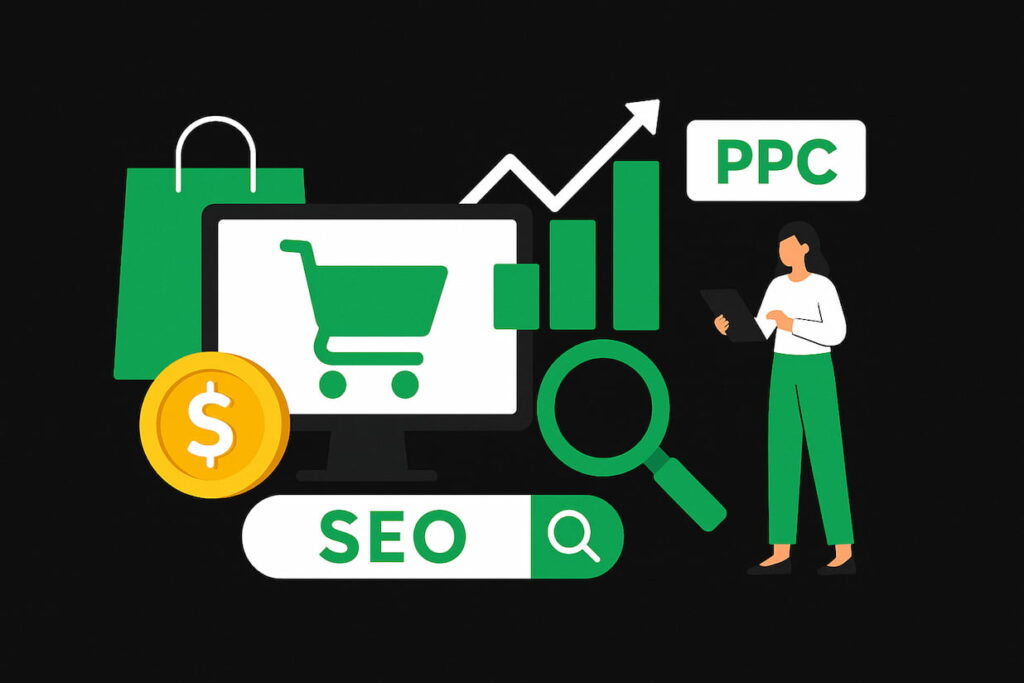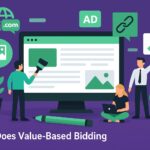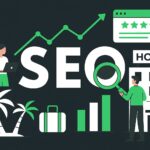Do eCommerce Sites Need SEO and PPC?
Every eCommerce business faces the same challenge: visibility. With thousands of competitors and millions of listings online, it’s not enough to just have a great product or a sleek website. You need to make sure your ideal customers can actually find you and that’s where SEO and PPC come in.
Search Engine Optimization (SEO) and Pay-Per-Click advertising (PPC) are two of the most powerful tools for driving traffic and sales. While some brands lean heavily on one over the other, the truth is that both play essential roles in a successful eCommerce strategy.
According to BrightEdge,43% of all eCommerce traffic comes from organic Google searches, which shows how critical visibility in search results really is.
So, do eCommerce sites need SEO and PPC? We’ll give you a straight answer: Absolutely and here’s why.
Why SEO Matters for eCommerce
SEO is the long game that pays off over time. It helps your products appear organically in search results, bringing consistent, high-intent traffic without paying for every click.
When your site is optimized correctly, you’re not just increasing traffic. You’re improving user experience, site speed, and credibility. A well-optimized site earns trust, which often translates into higher conversion rates.
In fact, Search Engine Journal reports that 70% of online users ignore paid adsand prefer to click on organic results. That means if your eCommerce store isn’t ranking organically, you could be missing out on the majority of potential customers.
Key SEO benefits for eCommerce:
- Long-term ROI:Unlike ads, organic traffic doesn’t disappear when you stop paying.
- Improved site health:Technical SEOenhances speed, navigation, and product discoverability.
- Brand authority:Ranking organically signals credibility to both search engines and shoppers.
From optimizing product pages and meta descriptions to using schema markup and targeted keywords, SEO ensures your store grows in visibility and trust over time.
Why PPC is Equally Important
While SEO builds long-term stability, PPC offers instant results. It’s perfect for new eCommerce sites that need immediate visibility or brands running promotions, flash sales, or product launches.
PPC allows you to appear at the top of search results even for competitive keywords, giving your brand prime real estate on Google. You can also control your budget, targeting, and timing to make it ideal for testing and scaling campaigns.
According to Google’s Economic Impact Report, businesses make an average of $2 in revenue for every $1 spent on Google Ads. When managed strategically, PPC doesn’t just drive traffic, it drives profitable growth.
Key PPC benefits for eCommerce:
- Instant exposure:Your products show up immediately for targeted searches.
- Data-driven insights:Campaigns reveal which keywords, products, and audiences perform best.
- Scalability:You can easily adjust ad spend to match business goals and seasons.
SEO vs. PPC: It’s Not a Competition – It’s a Partnership
Too often, businesses treat eCommerce SEOand PPC as opposing forces. In reality, the most successful eCommerce brands combine them.
Here’s how they complement each other:
- SEO builds credibility, while PPC captures attention for time-sensitive offers.
- PPC data helps identify high-converting keywords that can later be used for organic content.
- A strong SEO presence can improve Quality Scores, reducing PPC costs over time.
Think of PPC as the accelerator and SEO as the engine. Basically, one drives short-term momentum, the other ensures long-term performance.
How to Combine SEO and PPC for Maximum Growth
The best eCommerce strategies don’t treat SEO and PPC as separate efforts. They use both to support each other. Here’s how to make them work together effectively:
1. Use PPC to Test and Guide Your SEO
PPC campaigns deliver fast, reliable data. You can quickly see which keywords drive clicks and conversions, then use those insights to shape your SEO strategy.
If certain paid keywords perform well, build optimized product pages or blog posts around them so you can start ranking organically for proven, high-intent terms.
2. Keep Your Messaging Consistent
Your audience should see the same message and offers across both channels.
If your PPC ad says “Free Shipping on All Orders” or “20% Off This Week,” make sure that appears in your meta description and on your landing page too. Consistency builds trust, improves click-through rates, and strengthens your brand image.
3. Use Each Channel for Its Strengths
SEO and PPC play different roles and that’s exactly why you need both.
- Use PPCfor new launches, flash sales, and competitive keywords.
- Use SEOto build evergreen growth and organic visibility over time.
Think of PPC as your short-term accelerator and SEO as your long-term growth engine.
4. Retarget and Reconnect
Most shoppers don’t buy on their first visit. Use PPC retargeting ads to re-engage people who found you through organic search.
Show them related products, special offers, or social proof (like reviews). Retargeting keeps your brand top of mind and helps close the sale.
5. Share Data Between Teams
Your SEO and PPC data should work together and not in silos.
Use search term reports, keyword rankings, and conversion metrics from both sides to refine future campaigns. For example, keywords that convert well in ads can become SEO targets, while top-ranking organic terms can inspire more efficient ad copy.
When both channels share insights, you spend smarter and grow faster.
In short:
- PPC finds quick wins and conversion insights.
- SEO builds trust, authority, and sustainable traffic.
- Together, they create a feedback loop that drives consistent, measurable growth.
This balanced approach is how modern eCommerce brands stay visible, competitive, and ready to scale.
Sierra Exclusive’s SEO and PPC Approach
At Sierra Exclusive, we don’t treat SEO and PPC as separate silos. Our Sacramento SEO agencyand ad management servicemerge them into one cohesive growth system.
Our Growth-as-a-Service (GaaS) model blends technical SEO, content optimization, and paid campaign management into a unified strategy.
The goal? To maximize both immediate sales and long-term visibility, while ensuring every click, impression, and dollar spent contributes to measurable business growth.
Conclusion
Do eCommerce sites need SEO and PPC? Without a doubt.
SEO builds your foundation, PPC fuels your momentum, and together, they create a cycle of consistent growth.
Whether you’re looking to scale your online store, lower acquisition costs, or dominate your niche, the smartest move isn’t choosing one; it’s mastering both.
Ready to grow smarter?
LetSierra Exclusivehelp you design an integrated SEO-and-PPC strategy that turns traffic into consistent sales. Book a free strategy sessionwith us today and see your products gain more visits and conversions.
Frequently Asked Questions
What is the 80/20 rule for SEO?
The 80/20 rule in SEO means that roughly 80% of your results come from 20% of your efforts. Usually, your highest-performing pages and keywords. Focusing on optimizing those top assets delivers the greatest impact on traffic and conversions.
Is SEO still relevant in 2025?
Yes, SEO is more relevant than ever in 2025. With AI-driven search and growing competition online, strong SEO ensures your brand remains visible, credible, and discoverable where customers are already searching.
What is the golden rule of SEO?
The golden rule of SEO is to optimize for users first, search engines second. High-quality, relevant content that answers real questions will naturally earn better rankings and engagement.
Can you overdo SEO?
Yes, over-optimization can hurt your rankings. Keyword stuffing, excessive linking, or unnatural content signals to search engines that your site is trying to manipulate results rather than provide value.
What is the ROI of SEO vs PPC?
SEO delivers stronger long-term ROI because organic traffic compounds over time, while PPC provides immediate but paid visibility. The best results come from combining both: SEO for sustainable growth and PPC for quick conversions.
How do you optimize your ads for maximum ROI?
To maximize ROI, focus on high-intent keywords, strong ad copy, and precise audience targeting. Continuously A/B test creatives, refine landing pages, and use performance data to reduce wasted spend and increase conversions.





